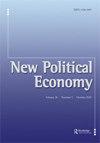民间观念在经济政策中的力量和中央银行-商业银行的类比
IF 3.8
2区 经济学
Q1 ECONOMICS
引用次数: 0
摘要
摘要本文认为,决策者的非专家或“民间”思想会以一种挑战经济决策由经济学和其他科学领域的专家思想指导的假设的方式影响政策结果。为了证实这一论点,文章援引了关于受众成本和民间经济理论的文献,强调了类比和谬误在政策制定中的力量。虽然政治经济学家只关注“家庭类比”在财政政策领域的力量,但对其货币政策等价物知之甚少,文章将其称为“银行类比”。从经验上讲,这种类比是在民间思想力量最不可能存在的情况下进行评估的:欧洲央行对其资产负债表的治理,这是欧洲最强大的资产负债表。本文章由计算机程序翻译,如有差异,请以英文原文为准。
The power of folk ideas in economic policy and the central bank–commercial bank analogy
ABSTRACT This article argues that policy-makers’ non-expert or ‘folk’ ideas can affect policy outcomes in a way that challenges the assumption of economic policy-making being guided by expert ideas emanating from the realm of economics and other sciences. To substantiate this argument, the article invokes literatures on audience costs as well as on economic folk theories to highlight the power of analogies and fallacies in the formulation of policy. While political economists have focused exclusively on the power of the ‘household analogy’ in the area of fiscal policy, much less is known about its monetary policy equivalent, which the article introduces as the ‘bank analogy’. Empirically, the analogy is assessed in the context of what is arguably a least likely case for the power of folk ideas to hold: the European Central Bank's governance of its balance sheet, the most powerful balance sheet in Europe.
求助全文
通过发布文献求助,成功后即可免费获取论文全文。
去求助
来源期刊

New Political Economy
Multiple-
CiteScore
10.10
自引率
9.50%
发文量
41
期刊介绍:
New Political Economy aims to create a forum for work which combines the breadth of vision which characterised the classical political economy of the nineteenth century with the analytical advances of twentieth century social science. It seeks to represent the terrain of political economy scholarship across different disciplines, emphasising original and innovative work which explores new approaches and methodologies, and addresses core debates and issues of historical and contemporary relevance.
 求助内容:
求助内容: 应助结果提醒方式:
应助结果提醒方式:


